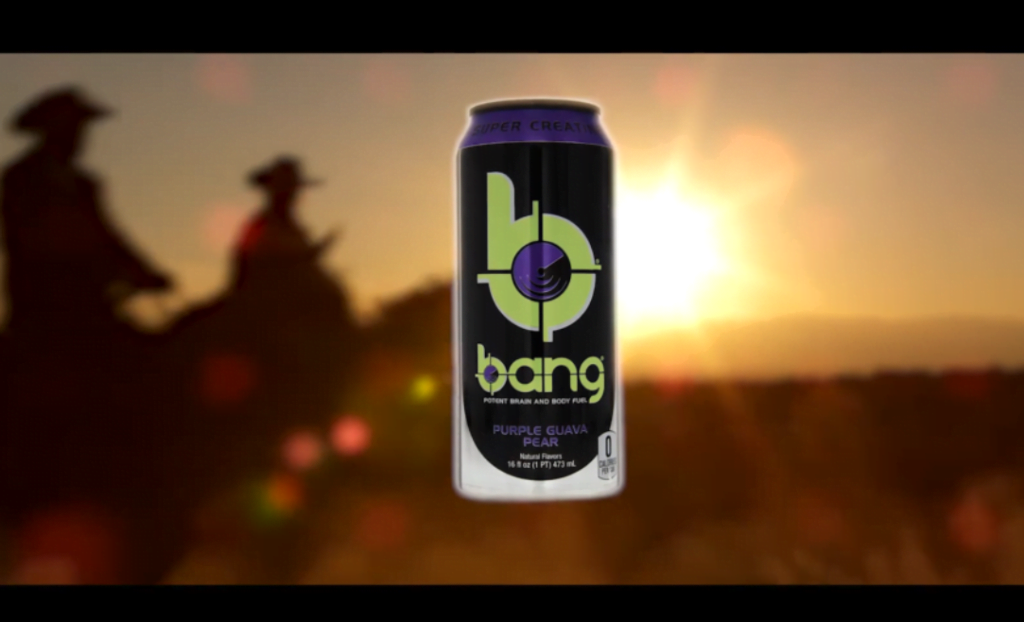Drinking too many Bang Energy Drinks can be harmful to your heart health. The high amounts of caffeine and taurine in these drinks can increase your blood pressure, put extra stress on your heart, and make strokes more likely.
If you want to know about the caffeine content, ingredients, and expert research of Bang Energy, read more.Is Bang Bad For You? (New Findings You Can’t Miss)
Introduction:
In recent years, energy drinks have become a staple for those needing a quick burst of energy. Among these, Bang Energy Drink has emerged as one of the most talked-about brands. There are growing concerns about the health effects of such beverages.
This article aims to unveil the truth about Bang Energy, exploring its ingredients and effects to help answer the question: Is Bang bad for you?

As someone who has navigated the busy lanes of life, relying occasionally on these fizzy cans for that much-needed boost, I understand the allure of Bang Energy Drink.
It’s popular not just for its promise of energy but also for the variety of flavors it offers. However, with popularity comes scrutiny. The unveiling of the truth about this popular energy drink requires a deep dive into what makes Bang tick
Ingredient Analysis

Is Bang Bad For You? – Unveiling The Truth Behind The Popular Energy Drink
When it comes to Bang Energy Drinks, it’s not just about whether they are bad, but more about understanding their potential threat to cardiovascular well-being.
Consuming an excessive quantity of these beverages, which contain notable quantities of caffeine and other stimulating components like guarana and taurine, can lead to a heightening of blood pressure, heart rate, and respiration.
From personal experience and insights into published medical research, it’s evident that these effects aren’t just fleeting discomforts but have been proven to cause elevated harm to the heart.
Instances of irregular heart rhythms and atrial fibrillation linked to these drinks are a growing concern. It’s crucial to consume these drinks in moderation, keeping in mind the possible dangers to cardiovascular health.
In the next sections, we’ll examine more about the ingredients in Bang Energy and delve deeper into what published medical research has to say. This exploration isn’t just an academic exercise but a necessary step to determine the impact of such popular beverages on our health.
As someone who’s navigated through the myriad of energy drinks, the insights I’ve gained underscore the importance of informed choices in maintaining one’s health.
Bang Energy: A Trend Among Younger Generations
Bang Energy, a popular brand among energy drink brands, has captivated the younger generations as a trendy coffee alternative and a dynamic pre-workout choice.
The brand eloquently describes its product line as revolutionary innovations, crafted not just to energize but to fuel the mind, body, and spirit, resonating deeply with its youthful audience.
Alternative Approaches to Energy
Maintaining healthy blood sugar levels and insulin sensitivity is crucial for sustained energy. Instead of relying on Bang Energy, exploring natural sources of energy, like balanced diets or physical activity, can be more beneficial in the long run.
Healthier alternatives might not provide the immediate rush of a high caffeine content drink, but they contribute to overall well-being without the adverse effects associated with artificial sweeteners and preservatives.
In summary, while Bang Energy might seem like a convenient solution for increased energy levels, it’s essential to be aware of its potential side effects and health concerns. Moderation in consumption, along with exploring healthier alternatives, is key to balancing the need for a short-term energy boost with long-term health considerations.
Does Bang Energy Drink Come with Any Benefit?
Bang energy drink has gained a reputation for providing an extra kick when working on demanding tasks. With 300mg of caffeine, it promises improved focus and energy compared to other caffeinated beverages, offering a higher bonus for cognitive performance.
When choosing Bang for that necessary quick drink to enhance your ability to work with increased efficiency, it certainly seems like an easy and effective way to maximize productivity. As someone constantly juggling various projects, I’ve felt this zest that Bang brings, a modern twist to the traditional energy boost.

This popularity, however, comes with a caveat. While maintaining a healthy lifestyle is key, it’s crucial to consume Bang in moderation.
The different types of content in the drink, for example, include creatine, which, in an unhealthy amount, might not be as beneficial for the body as one might think. It’s essential, therefore, to be sure of what you’re consuming.
From my experience, reading articles and seeking advice can help you choose wisely. They provide information on how to enjoy Bang’s benefits without overindulging.
Understanding what goes into your body is as important as the energy boost you seek from these drinks.
Energy What Is in Bang Energy Drink?
Energy drinks like Bang Energy Drinks have become a staple in many diets, but what exactly are you consuming? A typical 16-ounce can of Bang contains 300 milligrams (mg) of caffeine, equivalent to about 3 cups of coffee.
This is close to the daily caffeine limit recommended for humans, which is around 400 mg. For those new or sensitive to caffeine, the effects of too much caffeine can be significant, though not reported by the product manufacturer. Despite this, the caffeine content in Bang is not at potentially dangerous amounts if consumed within the safe limit.
In addition to caffeine, Bang includes creatine and branched-chain amino acids (BCAAs). Creatine, an essential amino acid, offers a range of benefits. It’s found naturally in the brain and muscles, where it’s stored as phosphocreatine.
Amino acids are the building blocks of proteins, vital for muscle building and repair. However, most Bang flavors contain only 4-32.5 mg per 16-ounce can, far lower than the 5g recommended daily dosage, making it unlikely to cause serious harm if consumed responsibly.
Bang’s unique ingredient, Super creatine (a compound of creatine and L-leucine), is said to increase mental focus. However, these claims have not undergone FDA evaluations, and whether they can cross the blood-brain barrier is still cautiously considered.
The presence of Coenzyme Q10 (CoQ10), known for producing energy at the cellular level, adds another layer to this drink.
The general intake for healthy individuals is about 90-200 mg per day, but studies to evaluate the true effects on mental performance and health are still ongoing. The existing evidence suggests that, while beneficial, these ingredients should be taken responsibly.
Caffeine Content And Its Effects
The high caffeine content in Bang Energy is designed to increase subjective energy levels through its short-term stimulatory effects. However, consuming too much caffeine in a short period can induce side effects such as anxiety, headaches, insomnia, and a rapid heart rate.
From my perspective, especially during hectic days when I relied heavily on energy drinks, I’ve personally felt these jitters and restlessness that underscore the importance of moderation.
It’s advisable to consider limiting caffeine intake to no more than 400mg per day, as recommended for general health. Specifically, caffeine-sensitive individuals should exercise caution. This approach not only helps in avoiding the immediate discomforts but also in maintaining a balanced lifestyle without becoming overly dependent on stimulants for energy.
Artificial Sweeteners And Their Impact
Bang Energy incorporates artificial sweeteners like sucralose to reduce calorie content, yet these can have negative effects on insulin function and insulin sensitivity. Although they offer fewer calories than regular sugar, thus leading to fewer spikes in blood sugar levels.

My experience and research highlight that excessive consumption, even over a short period, can lead to digestive issues such as gas, diarrhea, and bloating. This reflects the complexity of choosing artificial sweeteners in our diets, balancing the need for sweetness with potential health impacts.
Preservatives And Inflammatory Reactions
In Bang Energy, preservatives like sodium benzoate and potassium sorbate are used, which can alter gene expression and contribute to activating inflammatory pathways.
Some individuals may experience whole-body inflammatory reactions after consuming such additives. This aspect is crucial for those attentive to their dietary impacts on health and inflammation.
Added Vitamins And Minerals
Bang Energy touts its added vitamins and minerals as a key feature, but the scientific basis and research do not fully support the notion that consuming them improves energy. It’s recommended to avoid relying on such food products unless instructed by a doctor.
The overconsumption of fortified foods can lead to unsafe blood levels, particularly in individuals who already have normal levels of these nutrients. My journey in navigating the complex world of energy drinks has taught me the importance of understanding what goes into our bodies and the implications of these additives.
Overall, while Bang may provide a short-term energy boost due to its high caffeine content, there are several questionable additive ingredients from a health perspective. When choosing to consume this beverage, it’s essential to do so in moderation, being aware of potential side effects.
For those considering regular energy drink consumption, it’s advisable to proceed with following a doctor’s guidance to ensure safe and healthy choices.
Research Findings And Reviews
In exploring the explosive boost and catchy marketing claims of Bang Energy, a popular choice among younger generations as a coffee alternative and pre-workout drink, this article delves deep into the concerns about its potential negative health effects.
Through examining various ingredients and user reviews, alongside scientific research, we aim to uncover the truth about the effects of this popular energy drink, balancing its appeal with an informed understanding of its possible impacts on health.
Registered Dietitian’s Opinion On Bang Energy
Registered Dietitian Addie Roberts, on her YouTube channel ‘General Wellness’, offers a comprehensive review of Bang Energy from a health perspective, highlighting both benefits and drawbacks. In her personal experience and professional analysis of nutritional information, Roberts compares Bang with other popular energy drinks like Monster, Red Bull, and Ghost Energy.
She notes Bang’s advantage of having no added sugar but raises concerns over its additive ingredients. Consequently, Roberts recommends avoiding Bang and points towards a healthier formulation in the market that emphasizes natural compounds for improving physical energy and cognition.
Roberts suggests alternatives such as Ginkgo biloba and Panax ginseng extract, herbal supplements with research-backed energy-boosting and cognition-enhancing effects. For those looking for a simpler solution, she recommends black coffee as a healthier alternative to energy drinks, without the questionable additives found in products like Bang.
Her insights provide a balanced view, combining professional knowledge with practical advice for those seeking energy-boosting options.
Comparison With Other Energy Drinks
In comparing the market positioning of Bang Energy with other leading energy drinks like Monster, Red Bull, and Ghost Energy, it’s crucial to examine their Energy Drink components, particularly in terms of Added Sugar, Stimulant Ingredients, Questionable Additives, and Caffeine content, along with Artificial sweeteners, preservatives, and added vitamin blends.
| Energy Drink | Added Sugar | Stimulant Ingredients | Questionable Additives | Caffeine Content |
| Bang Energy | None | High (300 mg) | Artificial sweeteners, preservatives, added vitamin blends | High (300 mg) |
| Monster | High | Glucuronolactone, Taurine, Citric acid, vitamin blends | Artificial sweeteners, preservatives | High |
| Red Bull | High | Taurine, Citric acid, vitamin blends | Artificial sweeteners, preservatives | Moderate |
| Ghost Energy | N/A | Natural flavor, sucralose | Artificial sweeteners, preservatives | Moderate |
The absence of a significant energy boost in Bang Energy, when compared to fewer competitors, is notable. It should be consumed in moderation, keeping in mind the research findings and reviews on its drawbacks.
For individuals seeking a healthier choice, it’s always advised to consult a healthcare professional for personalized advice before consumption to determine its impact on health and well-being.
Summing Up: Insights and Guidance on Bang Energy Usage
In conclusion, Bang Energy can provide a temporary energy boost, but it’s crucial to be mindful of the additive ingredients and their potential impact on health. For those concerned about artificial sweeteners, preservatives, and flavor enhancers, exploring healthier energy drink options is advisable.
It’s also advisable to consult a healthcare professional before changing dietary habits, especially for individuals who may not tolerate high caffeine content well or have underlying health conditions that could be exacerbated by consuming energy drinks.
Moderation is key, and being aware of your caffeine tolerance and adhering to the recommended daily limits is essential for maintaining good health. Bang Energy, like any other energy drink, should be consumed with an understanding of its ingredients and potential effects on the body.
What EXACTLY is “Super Creatine” in BANG Energy Drinks?
FAQs: Is Bang Bad For You?
Q: Is Bang healthier than Monster?
When comparing Bang with Monster or even Reign Energy Drinks, the focus often shifts to which is better for you. A key aspect to consider is the Niacin content, which is notably lower in Bang. High levels of Niacin can be taxing on the liver, making Bang a potentially more liver-friendly option. However, this doesn’t automatically render Bang the healthier choice, as overall health impacts depend on various factors, including individual sensitivities and lifestyle choices.
Q: Is Bang better than Red Bull?
Whether Bang is better than Red Bull largely depends on individual needs and preferences. For those seeking a quick pick-me-up that won’t break the calorie bank, Red Bull could be more suitable. However, if you’re in need of a higher dose of caffeine and prefer a sugar-free option, then Bang would be the way to go.
Q: Is Bang OK to drink every day?
Yes, consuming excessive amounts of Bang Energy Drinks daily can put your cardiovascular health at risk. The high levels of caffeine and taurine present in this beverage can raise blood pressure and strain heart muscles, potentially increasing the chances of stroke occurrence. Moderation is key when it comes to such potent drinks.
Q: Is Bang better for you than Monster?
Bang, with its lower Niacin content, is less taxing on the liver compared to Monster. I switched to Bang for this very reason, especially after ordering the brands from best to worst from a Niacin standpoint: Bang at about 25%, Reign at 100%, and Monster at a whopping 200%.
This ranking speculates on results from studies showing that high doses of Niacin can be toxic, particularly for those who consume multiple cans a day. The niacin level in Monster products is extreme, even though it owns the Reign brand. This information is crucial for anyone considering their energy drink options.
Q: Is Bang Energy bad for you?
Bang Energy is not inherently bad if consumed in moderation. It’s important to be aware of the potential risks associated with its high caffeine content and artificial sweeteners. Balancing consumption with these factors in mind is key to enjoying Bang Energy safely.
Q: What is the safest energy drink to drink?
When considering the Healthiest Energy Drink, options like Celsius Live Fit and Zevia Zero Calorie Energy stand out. For the Best Energy Drink Overall, Guayaki Organic Yerba Mate and Clean Cause Yerba Mate are excellent choices.
Hiball Energy and Nuun Sport + Caffeine offer balanced energy boosts, while FOCUSAID Clean Energy and Zoa Zero Sugar Energy Drink are notable for their clean ingredients and minimal impact on health. These drinks prioritize natural energy sources and limit harmful additives, making them safer options in the energy drink market.
Q: What are the ingredients in Bang Energy?
Bang Energy, contains, carbonated water, citric acid, natural flavors, artificial flavors, caffeine, sodium benzoate, potassium citrate monohydrate, Essential Amino Acids, EAAs, sucralose, potassium phosphate dibasic, and vitamin C.
Q: Does Bang Energy have sugar?
No, Bang Energy does not contain traditional sugar. Instead, it includes carbonated water, citric acid, both natural and artificial flavors, caffeine, sodium benzoate, potassium citrate monohydrate, Essential Amino Acids (EAAs), sucralose (a sugar substitute), potassium phosphate dibasic, and vitamin C. This formulation offers a sweet taste without the added sugars found in many other energy drinks.
Q: How much caffeine is in Bang Energy?
A 16 fl. oz can of Bang Energy contains 300mg of caffeine, which is a significant amount. It’s essential to be mindful of your caffeine intake when consuming Bang, ensuring it does not exceed the recommended daily limit of 400mg.
Q: Is it safe to drink Bang Energy every day?
While consuming Bang Energy daily isn’t necessarily unsafe, it’s recommended to do so in moderation, ideally not exceeding one can per day. It’s important to pay attention to the potential side effects due to its high caffeine content and to heed the warnings on the labels. Moderation is key to avoiding adverse effects while enjoying its benefits.
Q: Does Bang Energy have any health benefits?
Bang Energy can provide an energy boost and contains ingredients like Super Creatine, B vitamins, and CoQ10, which have certain health benefits. However, it’s important to recognize that it’s not a healthy drink. Its primary benefit is to increase energy levels, rather than serving as a comprehensive source of nutritional benefits.
Q: Can consuming Bang Energy lead to addiction?
Regular, heavy use of energy drinks, including Bang, is associated with an increased risk of substance abuse and addictive behaviors. Consuming more than 300mg of caffeine per day can potentially lead to addiction. It’s crucial to consume Bang Energy responsibly and not rely on it as the sole source of energy to mitigate these risks.
Q: Are there any age restrictions on consuming Bang Energy Drink?
While there are no legal restrictions on the sale of energy drinks like Bang, it’s not recommended for consumption by anyone under 18 years old. This is primarily due to its high caffeine content, which poses potential health risks for younger consumers.
Q: Can drinking Bang Energy increase the risk of developing certain health conditions?
Drinking Bang Energy has been linked to an increased risk of developing conditions like hypertension, largely due to its high caffeine content. Consuming large amounts of caffeine can cause various cardiovascular issues. It’s important to be mindful of both your caffeine intake and sugar intake and to monitor your overall health when regularly consuming energy drinks like Bang.
Q: What are some alternative drinks to Bang Energy?
For those seeking alternative drinks to Bang Energy, options like Zevia Zero Calorie Energy and IMPOSSIBLE Energy are worth a try. Additionally, organic juices, kombucha, and green tea are excellent options that provide an energy boost without the risks associated with high caffeine content and artificial sweeteners. These alternatives offer a more natural and often healthier way to stay energized.






